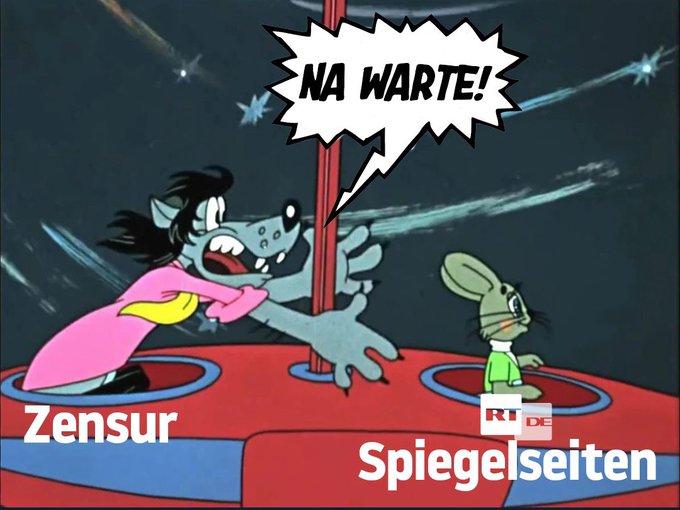That Russian state media outlets have developed varied ways to circumvent EU sanctions to continue reaching audiences in Europe is well documented. The methods often include the use of mirror sites, or identical copies of Russian state media websites hosted on unblocked domains. This strategy extends to social media platforms, on which RT and Sputnik use proxy accounts and other workarounds to bypass bans and geo-blocking of official accounts and channels. Russian state media openly acknowledges the practice. One of its mirror Telegram channels, RT Deutsch, the broadcaster’s German-language outlet, mocked EU attempts to block its content by using a famous Soviet cartoon, “Well, Just You Wait!” The animation is inspired by the US animated series “Tom and Jerry”. In the meme, RT depicts the wolf from the Soviet series as a censor (“Zensur”) who is helplessly trying to catch a hare, a symbol of RT Deutsch’s mirror pages (“Spiegelseiten”). The message is clear: EU efforts to block RT and Sputnik, enacted in 2022 after Russia’s full-scale invasion of Ukraine, are destined to fail.

To systematically explore RT’s and Sputnik’s sanctions evasion tactics, ASD analyzed all links posted in 2024 by the broadcasters’ official X and Telegram accounts in seven languages (Arabic, English, French, German, Portuguese, Serbian, and Spanish). Of those languages, all but German had a dedicated RT and Sputnik outlet, though RT’s Portuguese outlet (RT Brasil) simply translates relevant RT content into Portuguese. Sputnik also has two outlets targeting audiences in Africa, one in English (Sputnik Africa) and one in French (Sputnik Afrique). Across all studied accounts, ASD discovered 308 links leading to mirror websites, duplicate or near duplicate Telegram or X accounts, or freely available podcasts with RT and Sputnik content on popular streaming platforms. Upon assembling these links into an interactive dashboard, ASD observed the following patterns and tactics that RT and Sputnik employ to avoid EU content bans:
- RT and Sputnik accounts associated with languages whose primary audiences reside in the EU were more likely to link to mirrored content than those accounts whose primary audiences reside outside the EU. ASD observed a substantial number of mirror websites, alternative social media accounts, and podcasts in German, Spanish, English, and French but substantially fewer links in Arabic, Serbian, and Portuguese. Since RT and Sputnik are not blocked in Serbia, the Middle East, or Brazil, there is clearly less need to employ circumvention techniques to reach audiences there. It is also important to note that while Sputnik Africa and Sputnik Afrique broadcast primarily for audiences on that continent, the outlets also likely target diaspora communities in the EU.
- RT and Sputnik also produce podcasts, possibly to reach younger audiences and news markets that heavily rely on audio content, such as those in Africa. In addition to the likely automated network of RT Deutsch podcasts that ASD discovered prior to the 2025 German Bundestag elections, ASD’s analysis also revealed several professionally made Sputnik podcasts in English (26 links), French (29 links aimed at Africa), and Spanish (15 links aimed at Latin America). These podcasts are available on major music streaming platforms, such as Apple and Spotify, and on smaller specialized websites, such as Podcast Addict and Castbox. Not all the podcasts indicate a Sputnik affiliation in their titles or descriptions. Listeners to African Currents, for example, learn that the podcast is “proudly presented by Sputnik Africa” only if they listen to the host’s introductory remarks.
- Across all analyzed RT and Sputnik language services, there were more accounts that replicated all or part of the two broadcasters’ official accounts on Telegram than any other analyzed social media platform. Some of these channels are blocked in the EU, while others are still available, including an English-language Telegram channel dedicated to aggregated news bytes from RT and Sputnik. In a seemingly new tactic, some Telegram channels featured a link that automatically allows users to join alternative RT or Sputnik Telegram channels without having to search for and add them manually. ASD found such links for English- and German-language Russian state media content.
- RT Arabic’s journalists are active on Telegram. ASD discovered at least 34 channels that belong to individual journalists affiliated with RT Arabic. While the outlet’s official Telegram account is not available in the EU, the bloc’s citizens can still follow the channels of individual journalists who regularly share RT Arabic’s content. This creates a potential loophole that allows RT Arabic to circumvent content blocking and continue targeting Europe’s Arabic-speaking communities.
This report yet again demonstrates the challenges of enforcing the current EU ban on RT and Sputnik. Both outlets use their official social media accounts to alert followers to new alternative links or channels, allowing them to constantly stay a step ahead of regulators and moderators. Additionally, due to the focus on text- and video-based content, RT’s and Sputnik’s podcasts have gone largely unnoticed by European regulators and monitors. The task of tracking the spread of Russian-affiliated podcasts is complicated by the fact that many of these podcasts avoid explicitly mentioning their affiliation with Russian state media (at least in published descriptions), making it hard to detect them, particularly on smaller sites.
Tom never caught Jerry, and the wolf never caught the hare, yet their constant pursuit kept the show running. Admitting that a complete ban is impossible while remaining vigilant is perhaps the best tactic in an ever-adapting and ever-changing Russian propaganda digital environment.
The views expressed in GMF publications and commentary are the views of the author alone.





